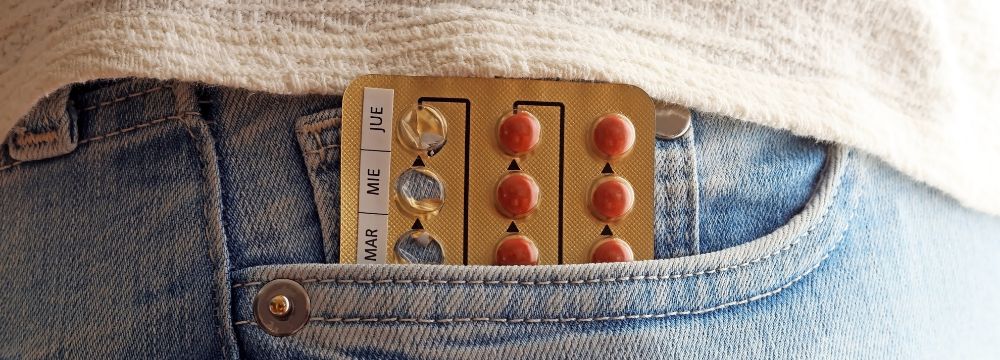Is Hormone Replacement the Key to Weight Loss in Middle Age?

If you’re experiencing some of the classic symptoms of menopause—night sweats, hot flashes, fatigue, and weight gain—you may have heard or read about hormone replacement therapy. Known as HRT for short, this treatment involves taking doses of hormones to relieve some of the discomfort that comes with menopause in women and “manopause” in men. Both women and men may find significant benefits from HRT, and a common question is: “Will hormone replacement therapy help me lose weight?” The answer: maybe. Here’s a breakdown of how HRT can—and can’t—help with weight loss.
Menopause and Extra Pounds
It’s normal to see some weight gain as you enter perimenopause (the transition period between being fertile and menopausal) and middle age. Many people have more difficulty maintaining their normal weight during this time and may find themselves a few pounds heavier, even while keeping the same habits. These extra pounds also tend to settle in the midsection rather than the hips and thighs, partly due to hormonal changes and other aging-related factors. For example, many women become less physically active as they get older, and humans, in general, tend to lose muscle mass with age. All these factors combined can contribute to unexpected weight gain.
Can HRT Help with Weight Loss in Females?
HRT isn’t explicitly prescribed for weight loss. However, many female patients who seek it out to relieve perimenopausal symptoms hope that weight loss will be an added benefit. Some research does suggest a connection between HRT and weight loss. For example, a small study published in 1999 found that women who received HRT lost small amounts of weight, whereas those who did not receive treatment experienced no weight loss. A 2024 study found that women taking semaglutide (the weight-loss drug known as Mounjaro or Ozempic) lost less weight than those who took both semaglutide and HRT.
However, it’s important to note that this weight loss is likely not a direct effect of the hormones. Women who benefit from HRT usually feel better once the hormones take effect—they have more energy, experience less brain fog, and sleep better at night. This means they’re more likely to exercise and make healthy food choices, naturally leading to weight loss. So, while HRT can indirectly support weight loss, it shouldn’t be considered a weight-loss drug.
Does HRT Cause Cancer?
One of the biggest concerns surrounding HRT and something that has proven to be a barrier for many patients seeking to get through middle age without the discomfort of hormonal imbalance is the perceived risk of cancer associated with hormone replacement. There is still much misunderstanding amongst patients and medical professionals alike. We now know that the data from an extensive study was prematurely interpreted, and the risk of cancer was significantly overstated. Generally speaking, HRT may be suitable and even protective for patients within 20 years of their last period; however, HRT can increase the risk of cancer if administered beyond this point.
Hormone replacement therapy in the form of testosterone is also commonly prescribed in males. While testosterone can be administered very safely, it’s important to understand that excess testosterone may be counterproductive or even dangerous. Be sure to speak to a qualified medical professional to understand your testosterone needs.
The Bottom Line
Not all perimenopausal women or middle-aged men need hormone replacement therapy. Some experience no symptoms at all, while others have mild symptoms that aren’t particularly bothersome. HRT is unlikely to contribute to your weight-loss efforts if you’re one of these individuals. However, if you have noticeable symptoms, HRT could help you feel more energized and motivated to make healthier lifestyle choices.
Regardless of your approach, here are some key tips to help prevent middle-age weight gain:
- Eat less. Metabolism naturally slows down with age. Starting around your 50s, you’ll need about 200 fewer calories per day than in your 30s and 40s. To avoid going hungry, focus on filling foods like fruits, vegetables, and whole grains rather than processed foods.
- Increase physical activity. Due to a slower metabolism, you may need a few extra minutes of exercise per day compared to when you were younger. If your body allows it, you can also increase the intensity—for example, swap 10 minutes of your half-hour walking routine with 10 minutes of jogging.
- Add strength training. Consider starting if you don’t already perform strength exercises several times a week. This can help counteract the muscle mass loss that comes with aging. Even simple, equipment-free exercises like planks, crunches, and push-ups can help. (Always consult your doctor before beginning or changing an exercise routine.)
- Seek professional guidance. If you’re unsure whether your lifestyle choices are optimal or if you have complicating factors like diabetes or heart disease, consider consulting a dietitian. They can create a personalized eating and exercise plan tailored to your needs.

